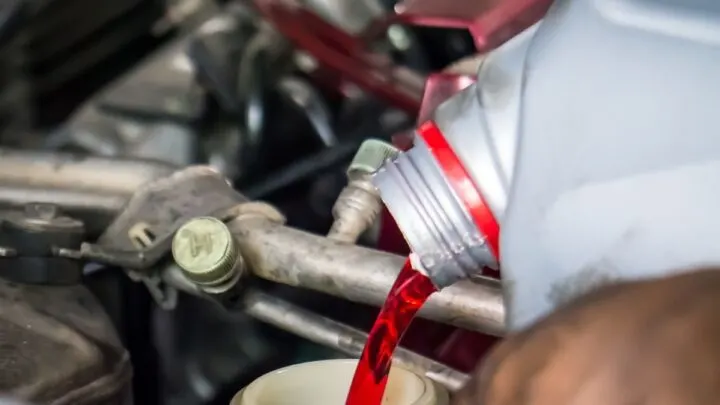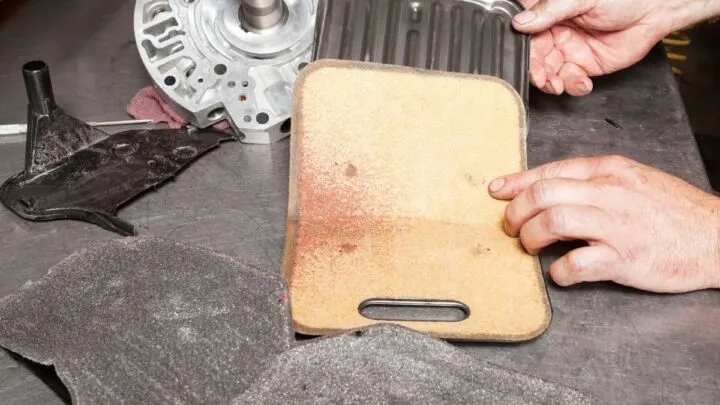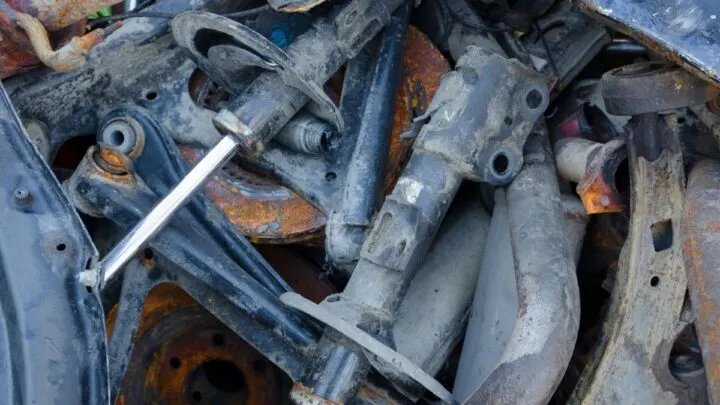Automatic transmissions are mechanisms that often work without drivers having to think about them. They do their work with very little help other than topping off fluids every now and then.
They can also be a little bit of a mystery to many when there is an issue with your car’s ability to run smoothly. Even some mechanics do not like to handle transmission issues when they arise because they are complicated.
So, why does my car jump when I put it in drive?
Cars that jump when put in drive may do so for a number of reasons. Some of the common ones include failing or misaligned sensors, low transmission fluid, dirty transmission fluid, a clogged transmission filter, a failing transmission pump, and worn-out parts.
Regardless of the source, this is not something that you want to ignore for long. Doing so could leave you stranded on the side of the road!
This article will cover all the warning signs that you want to know about so you can tell if your vehicle is failing, and will go over the different issues that might be causing your car to jump when you put it in drive.
Table of Contents
Jerk Issues When Putting The Car In Drive Explained

If your vehicle has been feeling jumpy and jerking whenever you put your car in drive, then this is a sign that your vehicle is having a tough time shifting gears!
With many cars now having computerized systems in their engines, this opens up the possibility of a failing sensor or shifted solenoid being the culprit.
If either of these options is the source, then the fix could be simple and not very expensive.
However, if you are car does not have a computerized system or the solenoid and sensors are not failing, then you will have to take a look at the transmission.
There are several different reasons why your car might jerk, and here are a few that you should look at.

Potential Reason #1 – Low Transmission Fluid
The system uses fluid to ensure that the system runs smoothly, and it needs the right amount of fluid to work correctly.
If your transmission fluid level is getting too low, you will start seeing issues with shifting in and out of gears.
This hard shifting will cause the jerk that you are experiencing and can cause your transmission system to not work as well.
The only way that your fluid would be low is because of a leak in the system. Because it is closed and doesn’t burn up the fluid like oil, your fluid level should not lower quickly.
If you are seeing a dark red color fluid where you park your vehicle, then this is a sign that you are losing transmission fluid to a leak.
Potential Reason #2 – Dirty Transmission Fluid
Your fluid can also affect your vehicle’s smooth shifting when the fluid is dirty. This happens by getting pieces of metal or dirt into the fluid, which will wear down your transmission system faster.
When dirty fluid is in your transmission system, the particles can affect your transmission’s ability to build hydraulic pressure. This will affect shifting gears because it will take a lot more work to do the job.
If you are noticing that your car is having trouble shifting into drive, but don’t see any leaking fluid, then check your fluid to see if it is dirty.
If it is, then you will want to get your transmission fluid changed out to see if this helps to fix the issue.

Potential Reason #3 – Clogged Transmission Filter
Your transmission filter can sometimes get clogged if a large particle gets inside the system. Unlike when the fluid is dirty, there may just be one or two particles that are causing the problem.
If the filter is clogged, this will put more strain on the transmission pump causing it to wear out more quickly. Also, it could cause a change in hydraulic pressure in the system or make the transmission function at a much lower level.
This doesn’t always mean that you should change or flush your transmission, especially if you have done so recently. However, you will want someone to take a look and see what is causing the clogging.
If the particle can be seen and removed, then you will see an improvement in your gear shifting quickly. However, if the particle is not easy to see, then you will do well to change the filter out.
It is recommended to change the filter each time that you get your transmission fluid changed to avoid any issues like this in the future.
Potential Reason #4 – Failing Transmission Pump
The transmission pump is nearby the filter, and if this pump begins to fail, then you could see some jumping whenever you try to shift gears.
If your pump is failing, you will also be able to hear a whining noise in the engine that can be clearly heard while driving. You might also see your check engine light come on if it senses that there is an issue with the pump.
If you have a clogged filter, then your transmission pump will be having to work harder to do its job. This could cause it to fail sooner than it should.
Compounding problems could be an issue that leads to expensive fixes. You don’t want to let your filter get clogged and allow the pump to fail because of it.
So, it is best to stay on top of things as much as possible to prevent these types of issues!

Potential Reason #5 – Worn Out Parts
A simpler reason for your shifting being jumpy is because of worn-out parts in your transmission system. If you have an older car, then this is one of the top reasons for feeling a jerk when you shift into drive!
Old parts don’t work as well, and they could cause loose shifting or over-revving. This can make your shifting more erratic and cause jumping when you try to put your car in drive.
Check your parts, or have a mechanic look at them to see if any need to be replaced. If so, replace the older parts and see if the problem persists.
If it goes away, then you know that the parts were the only problem.

Why You Should Take Care Of It Right Away
No matter what the issue is with your transmission, you want to deal with it right away instead of putting it off. Not handling the fix immediately could cause your car to have more damage the longer you drive it.
Also, you are taking a risk of your transmission completely failing and getting stuck on the side of the road.
Some small repairs don’t cost that much, but driving with a bad transmission could hurt your car more and cause you to need a more expensive fix.
So, don’t take transmission problems lightly and get them taken care of right away.
This will help you avoid paying more down the line for a larger issue and will keep you from breaking down unexpectedly and needing to get towed.
The Importance of Transmission Fluid
If your transmission fluid is low or in poor condition, it can make a huge difference in the performance of your vehicle!
So, checking for leaks, changing out your fluids regularly, and making sure that it isn’t getting dirty can make your car run smoother.
Low fluid levels can cause a host of problems, as you saw above, and it is best to maintain the levels and cleanliness as much as possible.
If you don’t know how often you should be changing your transmission fluid, you will want to check your car’s owner’s manual for the recommended number of miles between changes.
If you don’t have access to the owner’s manual, then you can choose to go by the typical recommendation of changing it out every 30,000 miles.
However, anytime that you notice your fluid getting dirty will be a good time to get another fluid change, even if the time in between changes is much shorter.
Final Thoughts On A Jerking Car
Taking care of your vehicle doesn’t take a ton of work, but knowing what issues stem from what system and how to fix them could be useful in diagnosing your vehicle’s problems.
When the transmission isn’t shifting as smoothly as it used to, this can cause a multitude of other problems.
So, you want to be able to figure out what exactly is causing your vehicles jerks, and what you can do to remedy the situation.
Getting costly fixes shouldn’t be normal, and when you are able to know what is causing your problem, you can get it fixed for less.
However, when it comes to shifting, you don’t want to take any chances. Your transmission system is important for your vehicle, and it can be a very expensive repair if you have to get it rebuilt.
Taking care of your transmission will put off having the system rebuilt for a long time and will keep that lump sum in your pocket.
Use this article whenever you need it to find out what is causing your car to jump when shifting gears and figure out what you can do to fix it without spending a ton at a body shop!
